How do I know if engineering is right for me? Should I become an engineer?

Dreams don’t work unless you do. — John C. Maxwell
How Do I Know if Engineering Is Right for Me?
One of our young assembly operators once asked me, “Do you need to be smart to be an engineer?”. My answer was simple: No. What you need is an interest in the subject, some ability in maths and science, and—most importantly—the determination to see it through. If you’re asking yourself, “should I become an engineer?”, the answer depends more on your curiosity and perseverance than your grades.
The young man in question was leaving to pursue an apprenticeship in engineering and was understandably wondering whether he was “good enough.” I told him something I often share: I wasn’t a top student. I finished school with average GCSEs—mostly Cs and Ds. But I wanted to be an engineer. I found a route that worked for me, and eventually, I earned both an engineering degree and chartership.
That story lit up his face, and it reminded me just how important it is to share these realities. So whenever someone asks about getting into engineering, I use myself as an example.
Which brings us to today’s blog post.
Before we get into the blog post, this thread is part of a larger series on Career Advice from my point of view and experience, so if you want to learn more click this link here – Careers.
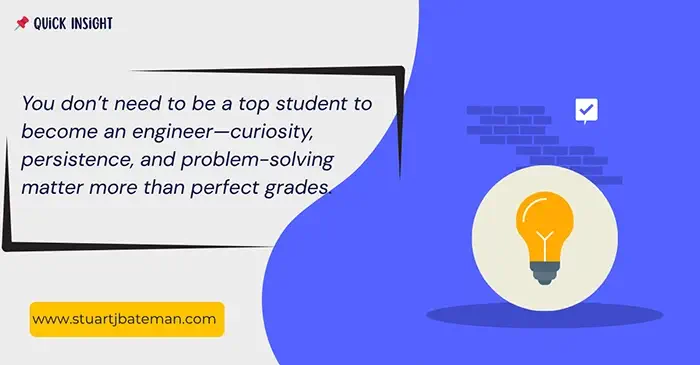
“How do I know if engineering is right for me?”
To answer this, I want to share the five questions I once asked myself—questions I now suggest others ask when they’re considering a future in engineering. If you’re wondering, “Should I become an engineer?”, this is a good place to start.
This isn’t about having the “right mindset” or passing an aptitude test. Instead, ask yourself these questions—or better yet, ask someone you trust to answer them about you.
1, Do you wonder how things work?
Are you curious about the mechanics behind the world around you—machines, materials, environments?
From a young age, I had a habit of taking things apart—engines, computers, even eggs—just to see how they worked. Understanding how forces and mechanisms functioned fascinated me. That curiosity is a strong sign that engineering may be a good fit.
I remember getting my first 600cc motorbike (a Kawasaki ZZR 600) and being nervous about how much grip the tyres had in corners. My friend and I researched tyre contact patches and friction, and discovered just how much grip a 10mm-wide contact area could provide. That knowledge completely changed how I approached riding.
2, Do you enjoy improving or creating things?
Engineers are natural tinkerers. Whether it’s making something from scratch or improving an existing solution, we’re constantly exploring ideas.
That process often starts with curiosity, followed by research, experimentation, failure, and iteration. For instance, I’ve spent hours using my 3D printer to build enhancements for my astrophotography telescope—larger knobs for fine adjustments, custom adapters for accessories, or mounts for cameras. It also keeps my CAD design skills sharp—something I developed through mechanical engineering.
You don’t need to be an expert from day one. You just need that desire to build, test, and improve. If you enjoy this kind of hands-on creativity, it’s another clue in answering the question: should I become an engineer?
3, Do you imagine future technologies?
Many engineers—myself included—were inspired by science fiction. For me, Star Trek opened my imagination to what the future could hold. And it’s not just fiction: plenty of modern technologies, including mobile phones and tablets, were inspired by shows like these.
But daydreaming isn’t just fantasy. Can you look at today’s problems and imagine future solutions? Do you see gaps in current technology and wonder how they could be addressed? If so, you’re thinking like an engineer already.
So again, ask yourself: should I become an engineer? If the idea of helping to shape future tech excites you, you might already be leaning toward a “yes.”
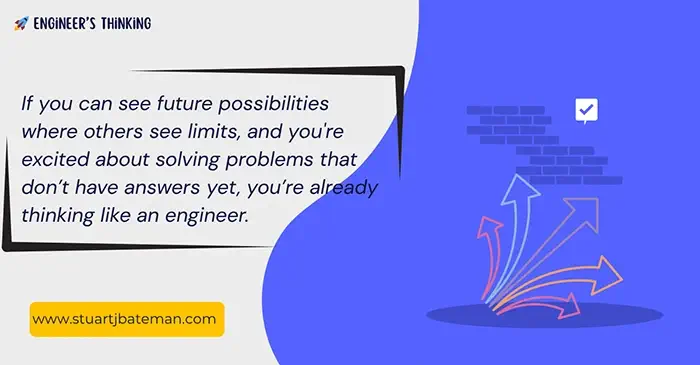
4, Do you want to improve people’s lives?
At its heart, engineering is about solving real-world problems—making life safer, more efficient, and more enjoyable for others.
This question is simple: Do you want to help people by solving their problems?
For me, that drive often takes shape in the workplace. If I can make the daily lives of my colleagues better—by improving their tools, workstations, or systems—so they stay safe, work effectively, and go home with energy left over, then I’ve done my job well.
It’s another important consideration when asking: should I become an engineer?
5, Can you visualise and explain ideas?
Engineers constantly sketch, doodle, or model ideas—on paper or using software. Having an image in your mind and turning it into something others can see and understand is an essential skill.
It doesn’t have to be perfect artwork. Concept sketches help spark conversations, test assumptions, and develop shared understanding.
I’ve had engineering ideas strike while driving—once, even a complex Excel formula—and had to find a way to quickly record the idea before it slipped away. (For the record, voice assistants like “Hey Google” come in very handy in those moments.)
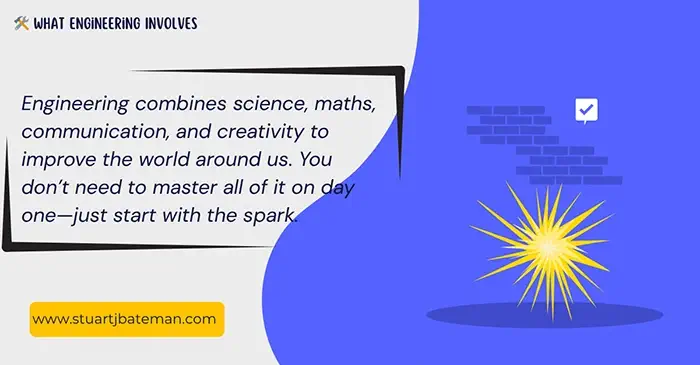
Summary
Engineering is about applying science to solve practical problems. It involves a mix of curiosity, creativity, and collaboration. Yes, you’ll use maths and science—often daily—but don’t let that intimidate you.
Here are just a few examples from my work:
- Maths: I regularly use calculus, trigonometry, and statistics, depending on the problem.
- Science: Physics principles—such as force, bending, and shear—are fundamental in manufacturing and mechanical design.
- English: Communication is critical. Writing clear reports, proposals, and instructions is part of everyday engineering life.
Final Thoughts Should I become an engineer?
If you asked me all those years ago, “Should I become an engineer?” I would have said yes—because I could answer “yes” to those five questions.
It took me eight years of training to get where I am today, but that was just one route of many. You don’t have to be top of the class. You just need curiosity, creativity, and the drive to solve problems.
So ask yourself the five questions. And if your answers are mostly “yes,” then you might just be an engineer in the making.
External Resources – Engineering
Check out these other sites for information about becoming an engineer, what it’s like and progress within the Profession.
Engineering Council – The Engineering Council website serves as the UK’s regulatory body for the engineering profession, maintaining the national register of over 228,000 engineers and technicians. It provides resources for professional registration, accredited programme databases, and professional standards information.
Institute for Engineering Technology – One of many great institutes for you to join later on as you progress in your career, I’ve found their resources extremely helpful and free, here’s a link to their career resource (you need to sign up first which is free).
Great minds in Stem – Have produce this fantastic free PDF that outlines the Engineering career path with examples and illustration so it’s not a long read for those that want a to the point information pack.
NewEngineer.com – Is a comprehensive career platform designed for engineers, offering opportunities to find top jobs, PhDs, master’s programs, short courses, summer schools, conferences and events across all engineering disciplines.
University of Cambridge – Known for its many connections with engineering (of other industries) connections, they have a comprehensive site that explains each sector that their students can explore, but it’s free for anyone to check out.

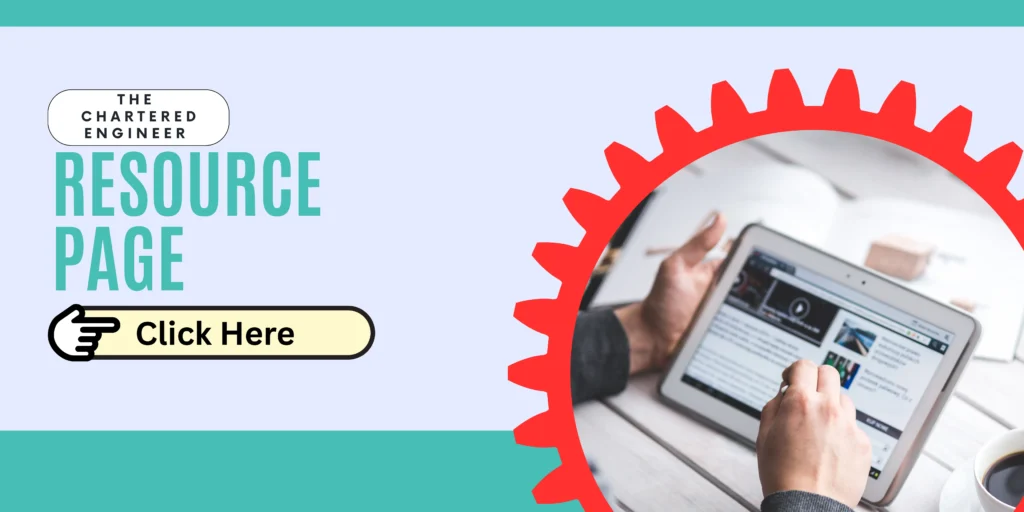
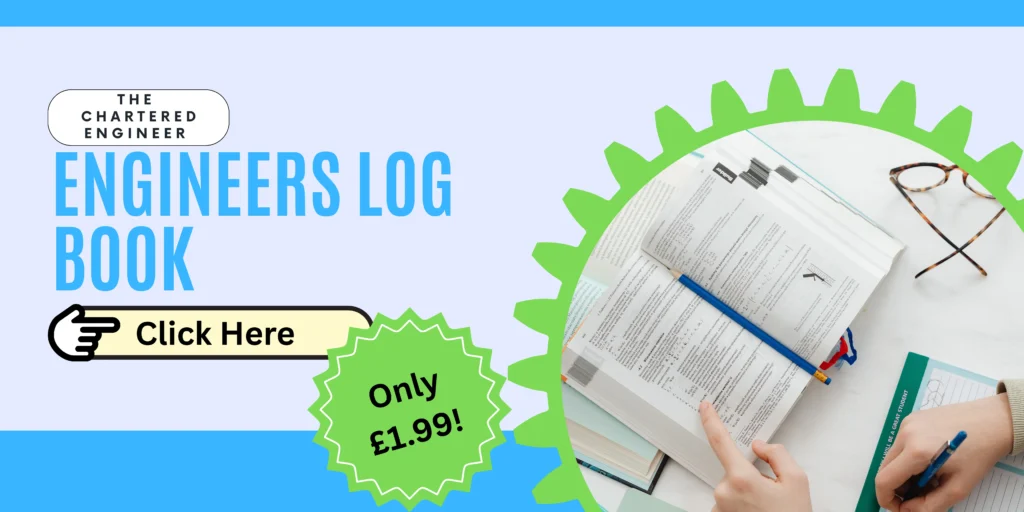
What are your thoughts? Have I covered everything or is there more you know and would like to share?
I’m always learning and improving this site and my blogs, so please feel free to get in touch with me via LinkedIn or this site to discuss any topics I have covered.
If you’re having trouble finding ways to progress check out these sites filled with free learning tools:


Discover more from The Chartered Engineer
Subscribe to get the latest posts sent to your email.